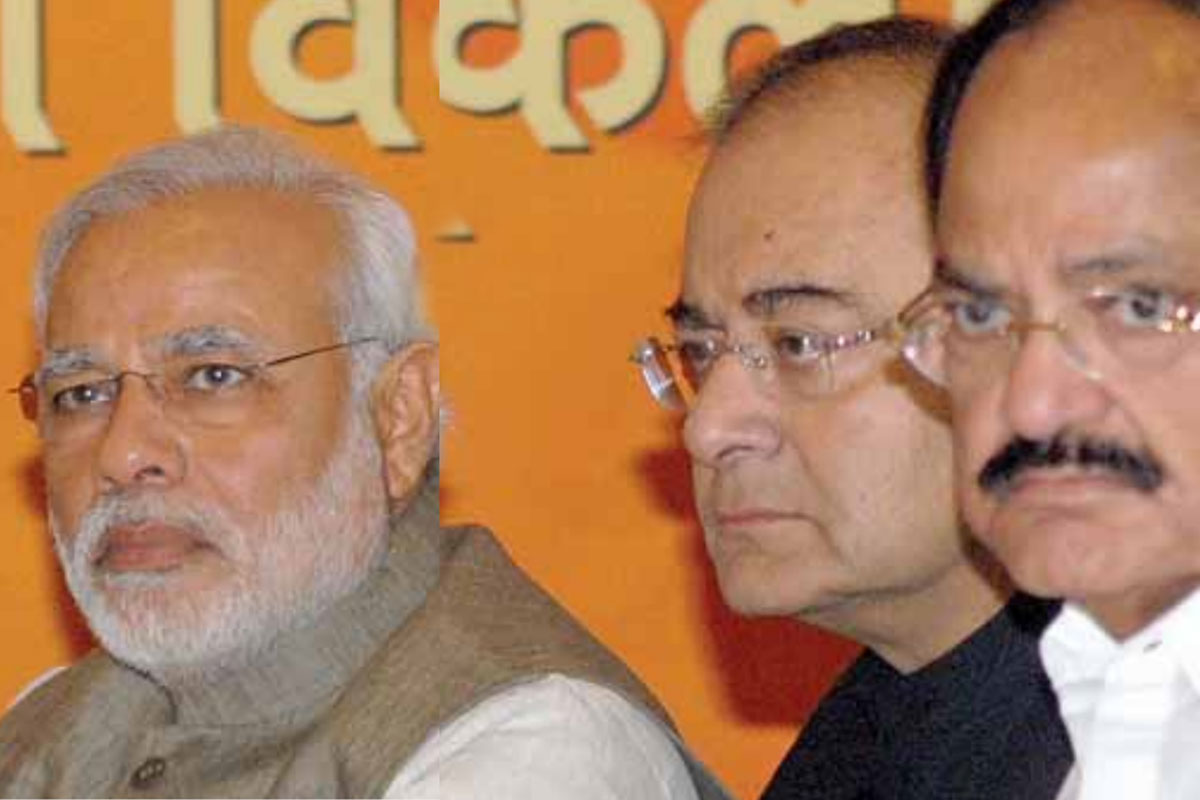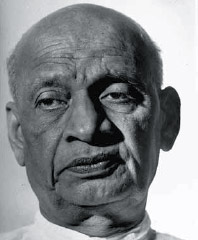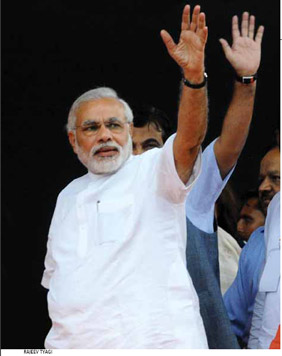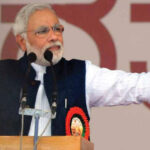- Cover Story
- Governance
- Globe Scan
- Corruption
- State Scan
- Talk Time
- Cover Story
- Governance
- Globe Scan
- Corruption
- State Scan
- Talk Time
Recent Posts
© Copyright 2007 - 2023 Gfiles India. All rights reserved powered by Creative Web INC.Cover StoryA challenge for Modi
The civil service, a bulwark of governance that Sardar Patel created, has today been reduced to a pitiable state. The new government has its task cut out to restore credibility to what was once called the ‘steel frame’ of India
MG DevasahayamJune 4, 20148 Mins read513 Views
 Narendra Modi and his team will have to tackle the task of rejuvenating the civil service on a priority basisWritten by MG Devasahayam
Narendra Modi and his team will have to tackle the task of rejuvenating the civil service on a priority basisWritten by MG DevasahayamA new government with new polity, new priorities, new hope and new promises, with ‘Governance for Development’ as its guiding principle, has assumed office. Only a committed bulwark can carry out the arduous agenda. The dictionary meaning of ‘bulwark’ suggests “any institution or instrument giving strong support or encouragement in time of need, danger, or doubt”. The new government needs such a bulwark to respond to the ‘dangers and doubts’ that linger in many minds. Among all the institutions and instruments in India’s governance framework, the civil service is most suited for this assignment because it is the only one that spans the country, from the remotest district to the portals of policy and power in Delhi, and has the experience of ‘field and the file’.

Sardar Vallabhbhai Patel was the architect of the civil service. Responding to the grave crisis created by the Partition and post-British administrative vacuum, he wrote to Prime Minister Jawaharlal Nehru in April 1948 advocating the formation of an independent civil service in the functioning of which “political considerations, either in its recruitment or in its discipline and control, are reduced to the minimum, if not eliminated altogether”. This was strongly opposed by the chief ministers of the States and many members of the Constituent Assembly. In his speech to the Constituent Assembly in October 1949, the Sardar thundered: “The Indian Union will go. You will not have a united India if you do not have a good All-India Services which has independence to speak out its advice….” Sardar Patel had his way and the All-India Services were established to be the bulwark of post-Independence governance.The perception in two recent surveys that the civil service has succumbed to political pressure and domination is most worrisome. This is not as per Sardar Patel’s scheme of things.Narendra Modi, a true disciple of the Sardar, is the head of government today. It is but natural that he would like the same instrument as the bulwark of his governance agenda. But the big question is—what is the state of the civil services today? Can it respond to the new upsurges and the call for effective governance for inclusive development? The answer appears to be no, if we go by public perception and the warped functioning of the service, once hailed as India’s ‘steel frame’. In 2010, two surveys on civil services came out in quick succession. One, an online survey with 340 responses gauged the public perception of the Indian administrative system. It was conducted by professors from the University of Bahrain and Institute of Management Technology, Dubai. The salient outcome of this survey was that over 90 per cent of the respondents felt that political pressure was the major constraint of the civil service system. An overwhelming 93.5 per cent felt that “the tendency among civil servants is to serve their political masters more than the public”, which means they are more politicians’ servants and less public servants! These numbers may not be sacrosanct, but the perception is real.
 The other was the ‘Civil Services Survey’ conducted by the Government of India, Department of Administrative Reforms and Public Grievances, to understand the civil servants’ perception of themselves and their service. The survey covered 18,432 officers belonging to 10 select services (All India and Central), both online and by post, and 4,808 (26 per cent) had responded. The survey was comprehensive and covered several dimensions of the civil services except the most important one—the issue of politicisation of civil services, acknowledged as the main reason for its decline and decay! This shows an ostrich-like delusion among the higher echelons of the government who authorised the survey!
The other was the ‘Civil Services Survey’ conducted by the Government of India, Department of Administrative Reforms and Public Grievances, to understand the civil servants’ perception of themselves and their service. The survey covered 18,432 officers belonging to 10 select services (All India and Central), both online and by post, and 4,808 (26 per cent) had responded. The survey was comprehensive and covered several dimensions of the civil services except the most important one—the issue of politicisation of civil services, acknowledged as the main reason for its decline and decay! This shows an ostrich-like delusion among the higher echelons of the government who authorised the survey!Nevertheless, 9 per cent (430) of the respondents on their own cited this as the major source of corruption and inefficiency in services and felt that political domination and interference affect officers’ contribution, motivation and initiative. They also expressed concern over the weakening of internal discipline in the services owing to the apparent powerlessness of senior officers to employ punitive measures on subordinates backed by political leaders. An alarming trend of manipulating the departmental disciplinary system and criminal justice system through political influence to reinstate officers suspended or dismissed was also recorded.
AN interesting irony is that while only 13 per cent in the ‘public perception’ survey expressed satisfaction at the service rendered by civil servants, in the ‘in-house’ survey 73 per cent of civil service incumbents (IAS 75.1 per cent) expressed satisfaction in their own service and the job! Buoyed by this ‘self-satisfaction’, the IAS Association is drawing up a formidable wish-list of pay, perks, dearness travel, other allowances, attendants, security, car, education for children, housing schemes, healthcare, insurance and risk coverage, entertainment and whatnot for the Seventh Pay Commission!
The seniors among them want continuous protection under the Single Directive which has been recently struck down by the Supreme Court. Single Directive was a consolidated set of instructions issued to the CBI by various ministries/departments regarding modalities of initiating an inquiry or investigating a case of corruption against a certain category of civil servants (joint secretary and above) in the Central Government where prior government approval was required. Never mind that in the last 10 years almost all the scams, scandals, improprieties and irregularities that have come out in the public domain bear the stamp of ‘senior civil servants above the rank of joint secretary’. With the State governments having their own variants of Single Directive, such scam-ridden officials at the Centre and in the States have been ruling the roost while honest and upright ones are hounded day in and day out.
BE that as it may, the perception in both the surveys that the civil service has succumbed to political pressure and domination is most worrisome. This is not as per Sardar Patel’s scheme of things. The Founding Fathers of our Republic, including Sardar Patel, had apprehended an era of “convulsive politics” and “self-seeking politicians” ruling the country in the years following Independence. As a counter-balance, higher civil services were expected to “give a fair and just administration to the country and manage it on an even keel”. To ensure this and to safeguard them from the “vicissitudes of political convulsions”, the IAS and IPS were given constitutional recognition.
In fact, the Constituent Assembly resolved to establish an All-India Services for ‘attracting to the highest services the best material available in the country transgressing political boundaries’. If the public perception is to be believed, this ‘highest service’ is now sub-serving the lowest political interests rather than performing public service for which they were recruited and covenanted.
Over six decades after Independence, exactly the opposite of what the Founding Fathers envisaged seems to have happened, clearly indicating an administrative collapse leading to appalling corruption and compromise that need to be squarely faced. It is cruel to expect the nation and its people to bestow huge pay, perks and prestige on its ‘best human material’ to function merely as ‘political servants’ and pander to wheeler-dealers.
Coming specifically to the IAS, one of the findings of the ‘public perception’ survey is that ‘over-insured job security has made a majority of them indolent and supremely arrogant’. This is too general and sweeping. Nevertheless, despite modern upbringing and liberal education, several IAS officials do suffer attitudinal and functional deficiencies. This is mainly because of the colonial system they inherited, which was marked by superciliousness, rigid hierarchy and servility to distant masters. Even after decades, democratic and free India has not reconfigured its civil services and the old culture of servitude, indolence and arrogance persists among many incumbents.
Globalisation and economic reforms in the 1990s brought in further change in the IAS. The FDI-GDP model of development turned into such a mania that a former Chief Secretary of ‘progressive’ Tamil Nadu openly exhorted: “Investors are coming to the State with lots of money. Our main job is to receive and facilitate them.”The crisis in the IAS started in the late 1950s when ‘development’ replaced ‘revenue’ as the major goal of administration, with development posts enjoying high prestige. At that time, India’s civil service system was widely seen as one of its assets. But the hierarchical layering of the system and IAS official’s lack of in-depth knowledge in various fields turned out to be major constraints in development administration. Jobs in the range of new industrial and commercial activities the State expanded into were also highly specialised and equally demanding of expertise. Though not qualified, IAS officials got themselves positioned in these posts. With the new jobs seducing upwardly mobile IAS officials, basic governance got neglected.
Globalisation and economic reforms in the 1990s brought in further change in the IAS. The FDI-GDP model of development turned into such a mania that a former Chief Secretary of ‘progressive’ Tamil Nadu openly exhorted: “Investors are coming to the State with lots of money. Our main job is to receive and facilitate them”. In the event, ‘facilitating’ the amiraadmi coming with millions and billions has become a higher priority for an IAS official in the reform era than basic governance of serving the aam aadmi living hand-to-mouth. These conflicting agendas have resulted in the IAS acquiring a split face. As a result, an administrative instrument conceived, designed and structured as a permanent civil service has virtually descended into a ‘spoils system’ absorbing the negative aspects of both.
In the present context, the IAS has two options—to continue as a permanent civil service or become a spoils system as in the US. By mixing up these two conflicting systems, the governance in the country is getting severely skewed. If the choice is the former, as would in all probability be, the service must go through fundamental and holistic reconfiguring to transform itself into a vibrant, transparent management cadre so that the unimaginative, acquiescing and egocentric civil servant can become an imaginative, unacquiescing and result-oriented manager. This cannot be achieved by bulky, repetitive ARC Reports or endless sermonising. To make this happen, the IAS reformers should become iconoclastic, take the bull by the horn and demolish pet theories, myths and mind-sets that have crippled the dynamism of the service.
First and foremost is the bureaucratic gagging—‘a civil servant should only be seen, not heard’. Under this anachronistic arrangement, some of India’s best minds that constitute the IAS are being throttled and wasted as mere status quo time-servers. What is worse, by remaining silent and unable to speak up against corruption and misrule, the conscientious among the IAS officers are fast losing their principles and personality. This is unacceptable, particularly in the face of mounting corruption and venality in governance that is destroying the fibre of our democratic polity.
THE notion of ‘subservience to political masters’ envisages a meek and ‘abdicating’ role for the IAS officials and, therefore, self-defeating. The IAS has a constitutional role to play in giving honest, fair and just governance to the people, particularly those the ruling politicians do not represent. In our skewed electoral system of ‘first-past-the-post’ and the reality of low voter turnout, ruling politicians hardly represent 25-30 per cent of the electorate. If the IAS officials strictly observe ‘political subservience’ and surrender to the rulers of the day, who represent only about a quarter of the population, and do their biddings without demur, ‘where will the majority flee?’
Too much of protection can reduce a person to cowardice. This is what is happening to the IAS officials—they willingly become cowards since they do not have the courage even to face a transfer or some minor inconvenience for upholding principles of honest governance. Like a ‘coward who dies a thousand deaths’, they are compromising and acquiescing every time just to keep their posts and positions safe. This is rank hypocrisy born out of an extreme phobia for security and protection and this must change.
The practice of ‘jack-of-all-trades’, fitting round pegs in square holes and square pegs in round holes, is the villain of professionalism and probity in civil service. By perpetrating non-professionalism and non-performance in governance, this feudal practice enables politicians to play favourites and gives them the unbridled power to post anybody for any job, the main criteria being their pliability and ‘surrenderability’!
Dismantling these archaic hangovers is a challenge and an opportunity for the new government. The PMO, which is the hub of governance, should assume a leadership position, declare an administrative crisis, rally the legislature and executive, and come out with a comprehensive reform/reconfiguration blueprint so that the civil service can become the bulwark of ‘Governance for Development’, which is badly lacking today!
The task is cut out for Prime Minister Narendra Modi and his A Team!
Recent Posts
Related Articles
Cover StoryTablighi Jamaat : 1000 years of revenge
Written by Vivek Mukherji and Sadia Rehman Two contradictions are evident. Through April...
ByVivek Mukherji and Sadia RehmanMay 5, 2020Cover StoryWINDS OF CHANGE
Written by Gopinath Menon ADVERTISING : The name itself conjures up exciting images....
ByGopinath MenonMarch 4, 2020Cover StoryTHE ECONOMIC ROULETTE WHEEL
Written by Alam Srinivas THE wheel spins, swings, and sweeps in a frenzied...
ByAlam SrinivasMarch 4, 2020Cover StorySYSTEMS FAILURE, SITUATION CRITICAL
Written by Vivek Mukherji ONE of most quoted allegories of incompetence for a...
ByVivek MukherjiMarch 4, 2020 - Governance
- Governance

























































 The other was the ‘Civil Services Survey’ conducted by the Government of India, Department of Administrative Reforms and Public Grievances, to understand the civil servants’ perception of themselves and their service. The survey covered 18,432 officers belonging to 10 select services (All India and Central), both online and by post, and 4,808 (26 per cent) had responded. The survey was comprehensive and covered several dimensions of the civil services except the most important one—the issue of politicisation of civil services, acknowledged as the main reason for its decline and decay! This shows an ostrich-like delusion among the higher echelons of the government who authorised the survey!
The other was the ‘Civil Services Survey’ conducted by the Government of India, Department of Administrative Reforms and Public Grievances, to understand the civil servants’ perception of themselves and their service. The survey covered 18,432 officers belonging to 10 select services (All India and Central), both online and by post, and 4,808 (26 per cent) had responded. The survey was comprehensive and covered several dimensions of the civil services except the most important one—the issue of politicisation of civil services, acknowledged as the main reason for its decline and decay! This shows an ostrich-like delusion among the higher echelons of the government who authorised the survey!
